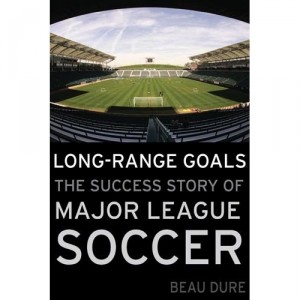 The United States’ performance in the World Cup last month, and the attention if brought, caused many commentators, sports and otherwise, to ask if this was the moment when soccer finally arrived in America. But in Long Range Goals: The Success Story of Major League Soccer veteran soccer journalist Beau Dure suggests that soccer has already made it here simply because MLS has, against all odds, survived over the course of its 15 years.
The United States’ performance in the World Cup last month, and the attention if brought, caused many commentators, sports and otherwise, to ask if this was the moment when soccer finally arrived in America. But in Long Range Goals: The Success Story of Major League Soccer veteran soccer journalist Beau Dure suggests that soccer has already made it here simply because MLS has, against all odds, survived over the course of its 15 years.
Before I get into the review, some disclosure is necessary. First, Beau is a personal friend. For years, I was a frequent poster on the BigSoccer message boards, and found him to be one of the few voices of reason there. This was largely because, as a writer for USA Today, his analyses were based on facts rather than club loyalty, although I often took umbrage with his habit of punctuating his arguments with Neil Peart lyrics. When I began covering soccer in 2006, we continued our long-running discussions at the RFK Stadium press box at D.C. United games.
On top of that, Beau has been a part of the Popdose extended family. He was a contributor to our Chartburn feature harkening back to the pre-Popdose days on Jeff Giles’ old Jefitoblog. By the time I left Washington, D.C. in the fall of 2008, a lot of our pre-game conversations in the media room worked around to something that had appeared on the site, much to the chagrin of our colleagues who weren’t as pop culture savvy. Trying to explain Mellowmas to a bunch of guys only concerned with United’s defensive woes was a surreal experience.
As for the book, Long Range Goals gives a comprehensive look at the history of MLS, from its origins as part of the deal to FIFA, world soccer’s governing body, to bring the 1994 World Cup to the United States, to a competitive league that developed the bulk of the current U.S. national team. Working chronologically, he gives a breakdown of what happened on the field in each season but wisely saves the bulk of the discussion for the business decisions at both the league and team levels that have been every bit as important as the games.
In telling the story, he uses quotes from many of the people – players, coaches, and league bigwigs – who have been responsible for making MLS what it is. One voice, however, is absent: Phil Anschutz, the billionaire head of Anschutz Entertainment Group who, at one point, owned 60% of the league, giving him the nickname “Uncle Phil” among American soccer fans. But, given that Anschutz has not spoken to the media since 1974, it was never likely.
His greatest accomplishment is where he chronicles, with considerable detail, the prolonged player-filed lawsuit that threatened MLS’ groundbreaking single-entity structure. Dure gets insight from people on both sides of the suit, which ruled in 2002 in favor of the league on all five counts.
Throughout the book, Dure refrains from declaring specific moments, like the U.S.’ quarterfinal appearance in the 2002 World Cup, the opening of the Home Depot Center in Los Angeles in 2003, or the 2007 signing of David Beckham, as moments in which the attitude towards American soccer turned. Instead, he offers them as stepping stones down a path towards a stability that has allowed the league to attract new investors and sponsors while expanding its brand across North America. He saves the bulk of his editorializing for the end, when he looks at the future of Major League Soccer and what it needs to do to continue growing. And even there he does it through the words of those he interviewed.
But Long Range Goals isn’t MLS propaganda. Dure doesn’t shy away from the growing pains that hurt the league in the early days, including the amateurish tenure of Doug Logan, the league’s first commissioner, the ever-changing and occasionally bizarre rules and regulations, and the decision in early 2002 to fold the Tampa and Miami teams, which, at the time, caused many to question whether the league would be around much longer.
Longtime MLS fans will love this book, thrilled that the early days of the league have been captured for posterity so well. They will not only remember many of the great moments in the league’s history, but also get a greater understanding of some of MLS’ more questionable decisions. But if you’ve only recently become converted to soccer through the recent World Cup and want to know more about the continuing growth of American soccer, Long Range Goals is a perfect place to start.
So Beau? Your book is great, but Rush still sucks.




Comments